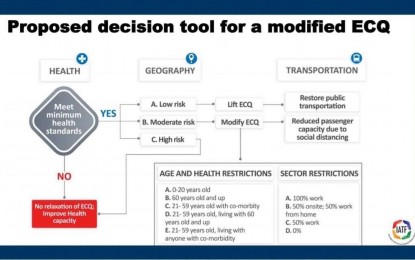
DECISION TOOL.The Inter-Agency Task Force (IATF) on Emerging Infectious Diseases proposes a decision tool with minimum health standards as central consideration in recommending whether to lift, modify, or extend restrictions under the enhanced community quarantine in Luzon.
MANILA – A lawmaker at the House of Representatives on Thursday said adopting a decision tool with minimum health standards as a guide will lead to “more logical, science-based approaches” in considering plans of lifting quarantine measures.
House ways and means committee chair Joey Salceda commended the Inter-Agency Task Force (IATF) on Emerging Infectious Diseases for its proposed decision tool that would primarily take into consideration minimum health standards in recommending whether to lift, modify, or extend restrictions under the enhanced community quarantine in Luzon.
“The health outcomes will decide everything. Any temporary recovery that takes place when we lift the ECQ prematurely is illusory. We need sustained recovery because certainty is the foundation of lasting economic recovery. That’s why I support the decision tool that the IATF is adopting,” Salceda said.
“My team will continue to support the IATF’s efforts to understand the science and the economics of the pandemic. Summarized, my advice to the IATF is that the better the health outcomes, the faster and the broader the recovery,” Salceda added.
Meanwhile, House Minority Leader Bienvenido Abante Jr. suggested that the government should continue strictly implementing the ECQ in Metro Manila and other areas with a high concentration of coronavirus disease (Covid-19) cases while isolating areas that have recently recorded zero community transmissions.
"There are 27 provinces that today have zero cases of Covid-19 and one of our priorities should be to ensure that we prevent the disease from spreading there,” Abante said.
"Perhaps we can consider lifting the ECQ in these provinces so businesses can reopen and residents there can go back to work,” he added.
Abante said this would require restricting movement in and out of areas with Covid-19 to vehicles transporting cargo and essential goods.
"Given the high rate of transmission in some parts of Metro Manila, we need to extend the ECQ in NCR (National Capital Region) and strictly implement it so no one comes in and goes out," he said.
He said that in areas within NCR with minimal cases, a modified ECQ may be adopted so that business establishments and industries can open at least three days a week.
He said the ECQ "must go hand in hand with efforts to immediately distribute subsidies to underprivileged families."
"Our people want to cooperate with the ECQ, but without livelihoods, they must be given financial support and essential goods to tide them over while we work to contain the outbreak,” he said.
President Rodrigo Duterte is expected to decide on whether to extend the ECQ after meeting experts and members of the IATF on Thursday. (PNA)
